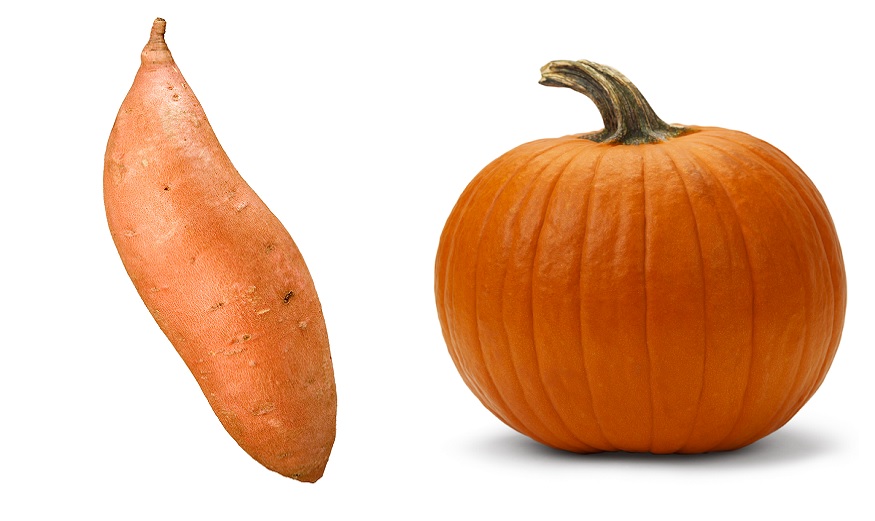Pumpkin vs. Sweet Potato: Which Is Better for You?

In this part of the world, the weather is turning cooler and crisper. Colorful leaves are gently floating to the ground, and pumpkin spice scents abound. Yep, it’s fall, y’all. And two food superstars in season right now are pumpkin and sweet potato. Which one you choose could be just a matter of taste, preference, or availability. But how close botanically and nutritionally are these two popular fall foods? Is one a healthier choice? Let’s end the pumpkin vs sweet potato debate once and for all.
Pumpkin vs Sweet Potato: Nutrition Facts
Before we start dishing out pumpkin vs. sweet potato facts, let’s take a quick look at nutritional values per one cup, raw:
Pumpkin Nutrition
- Calories: 30.2
- Carbs: 7.5g
- Fiber: .6g
- Sugar: 1.6g
- Fat: .1g
- Protein: 1.2g
- Vitamin A: 8,567 IU
- Vitamin C: 10.4mg
- Magnesium: 13.9mg
- Potassium: 394mg
Sweet Potatoes Nutrition
- Calories: 114
- Carbs: 26.8g
- Fiber: 4g
- Sugar: 5.6g
- Fat: .1g
- Protein: 2.1g
- Vitamin A: 18,866 IU
- Vitamin C: 3.2mg
- Magnesium: 33.2mg
- Potassium: 448mg
While pumpkin provides fewer carbs, sugar, and calories, it also doesn’t offer as many vitamins and antioxidants as sweet potatoes. Sweet potatoes are more nutrient-rich and dense (they weigh more per cup) and have 77% water vs. the 92% water found in pumpkins.
Sweet potatoes also provide more magnesium, potassium, copper, and vitamins A and B6 than pumpkins.
In other words, both pumpkin and sweet potato fit well into a healthy diet as they’re both rich in nutrients. And while sweet potatoes contain significantly more calories than pumpkin, they are still fairly low in calories.
Pumpkin vs Sweet Potato: Classification
Despite having similar colors when cooked, pumpkins and sweet potatoes are from different families, botanically. Pumpkins are considered a winter squash, similar to gourds and squash. Sweet potatoes, on the other hand, are root vegetables. Perhaps surprisingly, they’re in the same family as common bindweed and ornamental morning glories.
SPECIAL OFFER: Ageless Turmeric Supports Healthy Inflammation Levels & Detoxification. Now Up to 71% Off.
If you are growing them in your garden, the two are very easy to tell apart. The one thing that’s similar about these two vegetables is their orange coloring due to their high concentration of beta-carotene, an antioxidant the body can turn into vitamin A.
They also have comparable tastes and cooking times and can be used in similar recipes. What’s more, there are different varieties of both pumpkins and sweet potatoes, which can yield sweeter or more savory flavors, more white or yellow coloring vs. the standard orange. Some are more likely to be used in pies, while others are more often used in more savory dishes.
Pumpkins tend to be a bit creamier, while sweet potatoes tend to be softer. Sweet potatoes also tend to be sweeter and more flavorful than pumpkin, which is why more spices and sweeteners are often added to pumpkin recipes. So, you may need to adjust your recipes to account for the differences in flavor if you do substitute one for the other.
Pumpkin vs Sweet Potato: Health Benefits
Because they’re loaded with healthy nutrients, including beta carotene, both pumpkin and sweet potato help support cardiovascular health. Research indicates that pumpkin may help lower blood pressure, decrease triglyceride levels, and decrease LDL cholesterol. 1,2 Sweet potatoes—especially with darker flesh—may also help reduce the risk of heart disease, due in part to the high amounts of antioxidants. 3
Both pumpkin and sweet potatoes have the potential to help prevent cancer due to their rich supply of nutrients. Research has even supported pumpkins’ potential benefits against gastrointestinal cancers. 4 Sweet potatoes appear to help protect against colorectal, breast, and gastric cancers. 5 – 7
Which is Better: Pumpkin vs Sweet Potato
If weight loss is your top concern, you may find the lower calories, carbs, and sugar found in pumpkins more appealing. However, sweet potatoes are certainly not considered a high-calorie food and provide loads of nutrients within those calories. In fact, sweet potatoes are higher in both beta-carotene and immunity-supporting vitamins like C, as well as fiber to support gut and heart health.
At the end of the day, both pumpkins and sweet potatoes are a good fall choice, and both fit well into a healthy, nutrient-rich diet. So, go ahead and include both of these tasty foods in your seasonal diet this fall and winter.


 7 Signs Your Body is Seriously Low on Collagen (not just wrinkles)
7 Signs Your Body is Seriously Low on Collagen (not just wrinkles) Health Expert: "Turmeric Doesn't Work (unless...)"
Health Expert: "Turmeric Doesn't Work (unless...)" 3 Warning Signs Your Probiotic Supplement is a Total Waste
3 Warning Signs Your Probiotic Supplement is a Total Waste

